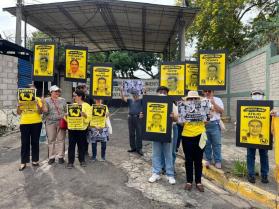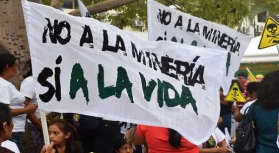Riot Police Attack Community for Defending Water Resources
On October 12, riot police in the Salvadoran department of Santa Ana accompanied by Salvadoran soldiers barged into the rural community of Cutumay Camones, attacking community members, including children and elders, for protesting against the construction of a garbage dump in their community. For months, the community organization ACOFUBEN has protested the garbage dump, as it will contaminate their water source and create a series of health problems for the community.
Community members are enraged at the violation of their right to be consulted on the building of the dump, and Human Rights Ombudsman Oscar Luna has criticized its construction for not having the appropriate legal permits from the Environment Ministry. The report that the Legislative Assembly received from the Salvadoran Court of Audits declared irregularities on the permit that the Environmental Ministry awarded to Presys, a private company. The permit application did not have an adequate environmental impact report and it was granted in violation of Article 25 of the Environmental Law, which demands that the public be consulted on any such project. Now, people must protest the construction of the dump in order to defend their water and health.
On October 12, police and military repression began during the early hours as tear gas and rubber bullets targeted the community, wounding many people. Then on October 25 the community was victim of another violent attack by the riot police. Media footage of the repressive police actions has been widely distributed, alerting the international community of these violent attacks and revealing the excess force of the riot police acted. Amidst the attack on the community, one television journalist was targeted by the riot police. You can see a videos of the attack here.
Since the incident with the journalist, police authorities have removed the offending police officers from the National Civilian Police. However, the removal of single officers for the attack on the television journalist is insufficient, as the military and police continue to defend private interests by repressing the community, and the construction of the garbage dump will go forward despite the community objection and protest. Social organizations continue to monitor and support the community in denouncing the ongoing repression and are calling for a real solution to the situation.
The FMLN and social organizations have denounced this repression and are demanding for the violence to be condemned by the government. ARENA deputies in the Legislative Assembly have rejected the FMLNs demands, assuring the public that the riot police were simply doing their job. However, Saca himself has admitted that there was an excess of force applied by the riot police against the population, but that it is an isolated case.
Health Privatization Law approved by right wing parties
On October 22, ARENA and PCN deputies approved the National Health System proposal so that it could go to a vote in the Legislative Assembly on October 25. The proposal of a National Health System law was created by the Francisco Flores administration and has been discussed since June of this year in the Health and Environmental Commission of the Salvadoran Legislative Assembly.
Social organizations and the FMLN have ardently rejected this law as it opens up the doors to the privatization of the national health system, which would leave the majority of the Salvadoran population without access to health care. FMLN deputy Zoila Quijada said lets see if President Antonio Saca will keep his word to not privatize the health care system by vetoing this law. According to Quijada, if the President ratifies the law he will only be building on the economic repression of his government by privatizing another service that the government should provide to its people.
During the day of the vote, the FMLN and the Citizen Alliance Against the Privatization of Health coordinated a protest against the vote on the law. Inside of the National Assembly, the FMLN opposed the law, but despite their arguments, the law was approved with the 52 votes of the right and center parties (ARENA, PCN, PDC, and CD.) Currently, the FMLN and the social movement have committed to continuing the struggle against the privatization of health through further organizing and greater mobilizations.
Social organizations and base communities protest against impunity
In a meeting with the Inter-American Human Rights Commission (IHRC) on October 10, the Salvadoran government sustained that it is impossible to investigate crimes committed during the armed conflict of the 1980s due to the existence of the Amnesty Law approved in 1993. At the same time, two Salvadoran human rights organizations held a follow up meeting with the IHRC on the Archbishop Oscar Romero murder with the participation of the Salvadoran government.
The Salvadoran government once again refused to accept responsibility for the assassination of Romero even though the IHRC declared it responsible for violating his right to life and for not investigating his case. The IHRC also requested that the Salvadoran government reverse the Amnesty Law, as it impedes the peace process toward peace in El Salvador.
Opus Dei member and Archbishop of San Salvador Saenz Lacalle has asked for patience and has defended the open dialogue between the Salvadoran government and the Catholic Church, both of whom attempt to minimize and silence Romeros importance to the Salvadoran people.
The Catholic Churchs Human Rights office has publicly denounced the unwillingness of the Archbishop and the Salvadoran government to investigate, but its public spokesperson David Morales was recently removed from the office in a right-wing attempt to silence popular demand for justice in the Romero case. Various social organizations and base communities have publicly criticized Saenz Lacalle and the Salvadoran government for refusing to investigate Romeros case and allowing impunity to reign in El Salvador.

 "I am a CISPES supporter because continuing to fight for social justice and a more people-centered country means continuing the dream and sacrifice of thousands of my fellow Salvadorans who died for that vision.” - Padre Carlos, New York City
"I am a CISPES supporter because continuing to fight for social justice and a more people-centered country means continuing the dream and sacrifice of thousands of my fellow Salvadorans who died for that vision.” - Padre Carlos, New York City

